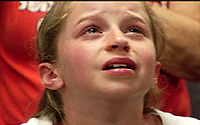 The documentary “Jesus Camp” directed by Heidi Ewing and Rachel Grady finally rolled around to my neck of the woods (Burlington, VT) this weekend. I was eager to see if the film was as “frightening” as so many journalists and reviewers have claimed, and if so, what exactly was so scary. (I would like to comment only briefly on my take on the film here. But for an additional perspective, as well as concise summary of the documentary, see my fellow blogger Kris Rasmussen’s astute post, “Jesus Goes to ‘Camp.’“)
The documentary “Jesus Camp” directed by Heidi Ewing and Rachel Grady finally rolled around to my neck of the woods (Burlington, VT) this weekend. I was eager to see if the film was as “frightening” as so many journalists and reviewers have claimed, and if so, what exactly was so scary. (I would like to comment only briefly on my take on the film here. But for an additional perspective, as well as concise summary of the documentary, see my fellow blogger Kris Rasmussen’s astute post, “Jesus Goes to ‘Camp.’“)
There is no doubt that Pastor Becky Fischer–a children’s ministry leader and head of the camp central to the film–is frightening. She spouts on about preparing kids to go to war, to go into battle, to become warriors and armies–the list could goes on regarding the military language and approach she seems to understand as necessary to form children into faithful Christians. Viewers will surely leave the movie frightened that such a camp actually exists.
But what is more frightening is that the documentary directors portray Fischer’s camp and ministry as if it is somehow indicative of the whole of evangelical children’s ministry across America, yet they do so without providing any additional footage to back up their implied claim. How is it that anyone can make such broad conclusions about evangelicals and Christian formation from a single camp? From a single pastor? Where “Jesus Camp” fails miserably is that it sticks tightly to its title: It explores only “camp,” in the singular, a sample size of one.
Ewing and Grady indeed may be onto something–that there are disturbing happenings across America with regard to our children and religion. But if that’s really the case, they need to show us this with a much wider lens. And I’ve seen too many positive evangelical ministries to believe that these directors have given us the whole story–or even a large piece.
So if you want to see the ravings of Pastor Becky Fischer and her “Jesus Camp” go right ahead. Just remember that’s all you are seeing. No more, no less.


